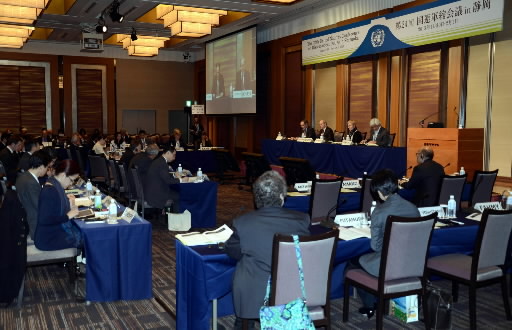Inhumanity of nuclear weapons raised at U.N. conference on disarmament issues in Shizuoka
Feb. 5, 2013
by Michiko Tanaka, Staff Writer
On January 30, the United Nations Conference on Disarmament Issues opened at a hotel in Shizuoka, Japan. About 70 government officials overseeing disarmament matters, along with experts in the field and three international organizations, are taking part in the three-day conference. The participants have gathered from 16 nations, including the United States.
On the first day, there was active discussion under the theme “Humanitarian Issues and Nuclear Weapons.” On the subject of banning the use of nuclear weapons, Mari Amano, the ambassador of Japan to the Conference on Disarmament in Geneva, expressed hesitation, saying, “Pursuing such a ban may invite a backlash from the nuclear weapon states and result in unproductive discussion.”
Last October, more than 30 countries released a joint statement, urging the nations of the world to work toward making nuclear weapons illegal. In March, an international conference focusing on the inhumanity of nuclear weapons will be held in Oslo, Norway. At the gathering in Shizuoka, a number of voices praising such efforts to put a spotlight on the inhumanity of nuclear arms, and calling for a ban on these weapons, have been heard.
Japan, however, has declined to back that statement, arguing that it does not cohere to the nation’s security policy, which relies on the nuclear deterrence provided by the United States. Mr. Amano maintained, “I am not convinced by the measures being proposed to hasten a ban on nuclear weapons. Proceeding with negotiations in a steady and gradual manner will provide the shortest route to the elimination of these weapons.” To this, one participant responded critically, “If the A-bombed nation of Japan declines to join the statement, it will weaken the effort.”
Amid growing tensions in the international community following North Korea’s declaration of its intention to conduct a third nuclear test, the issue of the denuclearization of Northeast Asia has also become a focal point at the gathering.
Hiromichi Umebayashi, the director of the Research Center for Nuclear Weapons Abolition at Nagasaki University, pointed out, “North Korea’s attempt to swiftly develop nuclear weapons demonstrates its fear regarding its national security.” Mr. Umebayashi presented his idea of Japan, South Korea, and North Korea creating a nuclear-free zone and, in addition, that these nations obligate the nuclear powers to pledge not to stage a nuclear attack on this zone.
Until its conclusion, on February 1, the disarmament conference will feature discussion on such issues as the challenges to be faced in anticipation of the review conference of the Nuclear Non-Proliferation Treaty (NPT), slated for 2015, and the safety of nuclear power stations following the accident at the Fukushima No. 1 (Daiichi) nuclear power plant.
The conference has been organized by the United Nations Office for Disarmament Affairs and the United Nations Regional Centre for Peace and Disarmament in Asia and the Pacific. Held annually in Japan since 1989, this year’s gathering is the 24th conference.
(Originally published on January 31, 2013)
On January 30, the United Nations Conference on Disarmament Issues opened at a hotel in Shizuoka, Japan. About 70 government officials overseeing disarmament matters, along with experts in the field and three international organizations, are taking part in the three-day conference. The participants have gathered from 16 nations, including the United States.
On the first day, there was active discussion under the theme “Humanitarian Issues and Nuclear Weapons.” On the subject of banning the use of nuclear weapons, Mari Amano, the ambassador of Japan to the Conference on Disarmament in Geneva, expressed hesitation, saying, “Pursuing such a ban may invite a backlash from the nuclear weapon states and result in unproductive discussion.”
Last October, more than 30 countries released a joint statement, urging the nations of the world to work toward making nuclear weapons illegal. In March, an international conference focusing on the inhumanity of nuclear weapons will be held in Oslo, Norway. At the gathering in Shizuoka, a number of voices praising such efforts to put a spotlight on the inhumanity of nuclear arms, and calling for a ban on these weapons, have been heard.
Japan, however, has declined to back that statement, arguing that it does not cohere to the nation’s security policy, which relies on the nuclear deterrence provided by the United States. Mr. Amano maintained, “I am not convinced by the measures being proposed to hasten a ban on nuclear weapons. Proceeding with negotiations in a steady and gradual manner will provide the shortest route to the elimination of these weapons.” To this, one participant responded critically, “If the A-bombed nation of Japan declines to join the statement, it will weaken the effort.”
Amid growing tensions in the international community following North Korea’s declaration of its intention to conduct a third nuclear test, the issue of the denuclearization of Northeast Asia has also become a focal point at the gathering.
Hiromichi Umebayashi, the director of the Research Center for Nuclear Weapons Abolition at Nagasaki University, pointed out, “North Korea’s attempt to swiftly develop nuclear weapons demonstrates its fear regarding its national security.” Mr. Umebayashi presented his idea of Japan, South Korea, and North Korea creating a nuclear-free zone and, in addition, that these nations obligate the nuclear powers to pledge not to stage a nuclear attack on this zone.
Until its conclusion, on February 1, the disarmament conference will feature discussion on such issues as the challenges to be faced in anticipation of the review conference of the Nuclear Non-Proliferation Treaty (NPT), slated for 2015, and the safety of nuclear power stations following the accident at the Fukushima No. 1 (Daiichi) nuclear power plant.
The conference has been organized by the United Nations Office for Disarmament Affairs and the United Nations Regional Centre for Peace and Disarmament in Asia and the Pacific. Held annually in Japan since 1989, this year’s gathering is the 24th conference.
(Originally published on January 31, 2013)








